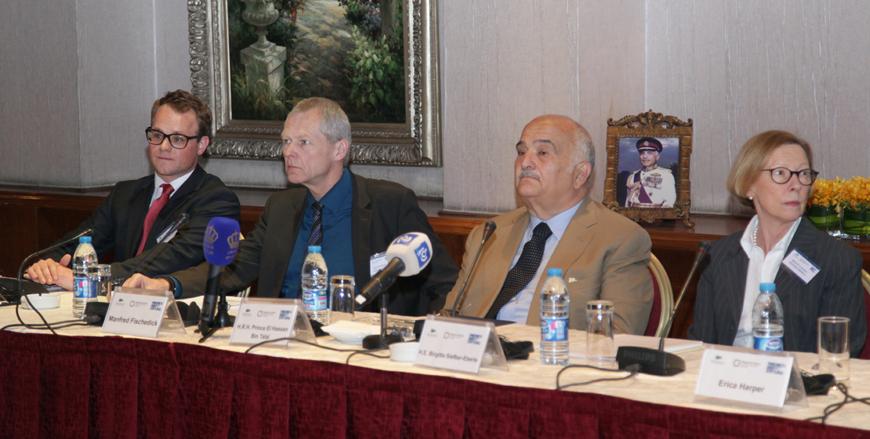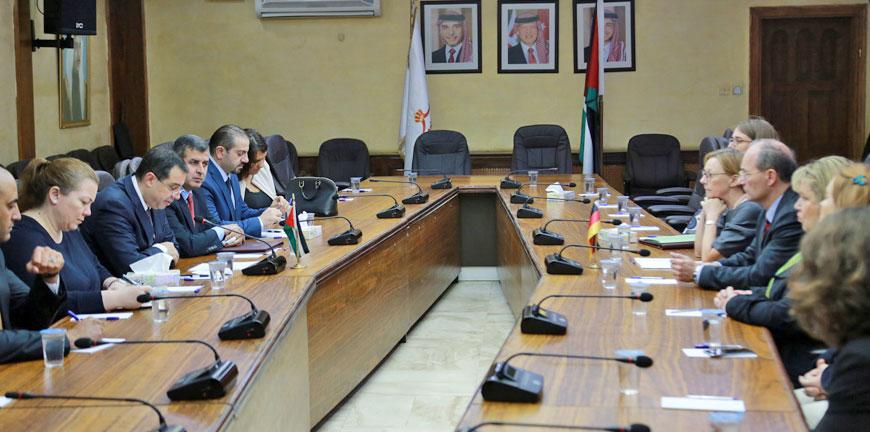You are here
‘Integrated water, energy planning core element to sustainable development’
By Hana Namrouqa - Apr 07,2016 - Last updated at Apr 07,2016

HRH Prince Hassan attends the Water-Energy-Nexus: Integrated Energy and Water Planning in the WANA Region Conference in Amman on Wednesday (Petra photo)
AMMAN — Despite existing interdependencies between energy and water, decision makers, planning institutions and the scientific research community are still analysing both sectors separately, experts said on Wednesday.
Weakness in research in the water-energy nexus holds particularly true for the West Asia North Africa (WANA) region, where research in the related risks of energy and water supply is still at an early stage, the experts noted, arguing that this weakness should be addressed urgently as the region is strongly affected by the water-energy-nexus issue.
The Jordanian, German and international experts in water, energy, environment and sustainable development warned that failing to reflect on the interdependencies between the water and energy sectors would lead to contradicting strategies.
They made the remarks during the Water-Energy-Nexus: Integrated Energy and Water Planning in the WANA Region Conference, which was organised by the Friedrich-Ebert-Stiftung, Wuppertal Institute for Climate, Environment and Energy and the WANA Institute.
Integrated water and energy planning is a core element to contribute to sustainable development, particularly in the WANA region, Wuppertal Institute Vice President Manfred Fischedick said.
He noted that coal power plants account for 7 per cent of water withdrawal globally, adding that the figure is set to double within the next 20 years.
"Renewable [renewable energy sources], especially wind and photovoltaic, provide a solution for tomorrow's water resource challenges and address climate change as they need less water resources for operation," Fischedick said.
Underscoring that there is a strong need for a holistic approach for water, energy and climate change, Fischedick also noted that there is a missing experience on how does integrated water and energy planning and policies look like, proposing mapping and assessing of existing national water-energy nexus strategies and policies, as well as incorporating the water-intensity of energy technologies into the decision-making process when shaping future energy systems.
Studies indicate that the region's already existing water gap will increase to almost 200 billion cubic metres per year by 2050, according to organisers of the event, who noted that electricity demand induced by the projected water demand increase is considered in very few power scenarios.
However, organisers said that research has shown that the projected expansion in the region's water gap will lead to an additional electricity demand of up to 40 per cent.
HRH Prince Hassan, Chairman of WANA Institute, called for focusing on the energy-water-human dignity nexus.
"I believe that human dignity is central to any future thinking in terms of security and stabilisation. We heard so much in terms of security and weapons of mass destruction, security and the war on terror, but what about the empowerment and the enablement of citizens to feel that they are stakeholders in their future," Prince Hassan said.
He raised a question during the opening of the event on "how can we create a carrying capacity in this region when we have no knowledge-base in terms of human resources".
Meanwhile, German Ambassador to Jordan Birgitta Siefker-Eberle said that the water and energy sectors are challenging for countries in the region and especially for Jordan.
"Jordan is one of the most water scarce countries in the world and have been facing an increasing pressure on its resources due to the growing population in the context of the refugee crisis as well as due to the consequences of climate change," the ambassador said.
At the same time, Jordan is highly dependent on the import of energy, she added, citing estimates that 97 per cent of Jordan's energy is based on foreign import.
"Obviously this presents a major burden on the national economy," Siefker-Eberle said. She noted that while electricity generation in Jordan is almost entirely based on imported fossil fuel, managing water supplies with more energy efficiency would directly result in decreasing energy demand, CO2 emissions as well as costs.
During last year, national water demand stood at 1.205 billion cubic metres, while supply stood at 972mcm, according to figures from the Ministry of Water and Irrigation, which also showed that the water deficit last year was 233mcm.
The cost of electricity for pumping water stood at JD141 million in 2014, which constituted to 45 per cent of the operation and maintenance cost that year, according to the ministry's 2016-2025 National Water Strategy, which indicated that the use of renewable energy technologies will be expanded to protect the environment and control fluctuating energy cost in the water sector.
“By 2025, energy consumption at water utilities will be cut by 15 per cent, while renewable energy’s contribution to the water sector’s energy supply will be raised to 10 per cent,” the strategy said.
Related Articles
AMMAN — German Ambassador to Jordan Birgitta Siefker-Eberle on Thursday stressed her country's support to Jordan's social protection sector,
AMMAN — The government and the German Development Bank (KfW) on Saturday signed a soft loan agreement worth 30 million euros to finance the
AMMAN — Germany has allocated 127.9 million euros as additional aid in grants, technical assistance and soft loans that target "substantiall

















